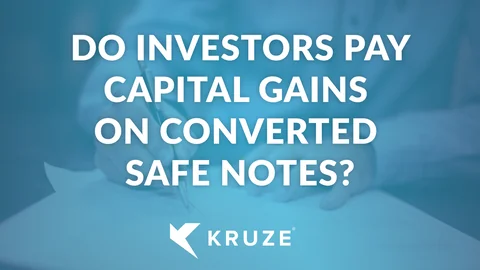
One fairly complicated question we encounter is “Do investors have to pay capital gains taxes each time the valuation of a company goes up when, at the same time, the company’s SAFE notes have been converted to equity but have not been sold?” This can be confusing for a lot of people, but the answer is actually pretty straightforward.
A simple agreement for future equity (SAFE) note is a type of financing that many startups use. A SAFE note is a legally binding agreement that allows an investor to purchase a specific number of a company’s equity shares at an agreed-upon price at some point in the future. So an investor gives a startup money, and in exchange gets a promise for a specific amount of equity when certain conversion events occur. Typically, SAFE notes convert when your startup raises its next round of financing, if your company is acquired, or if your company goes public with an IPO.
What Happens When SAFE Notes Convert?
When a startup reaches a conversion event, their SAFE notes will typically convert into either:
- Common stock
- Preferred stock
This will depend on the type of SAFE note and the deal between the investor and the startup. However, the important thing to note at this point is that there hasn’t been any realization of this stock. Tax law views a SAFE note conversion as a change in ownership rather than a stock sale
Do Investors Pay Capital Gains on Converted Safe Notes?
So, the stock has not been sold, it has just been converted into something else. This means, generally speaking, if it is just a straight conversion, an investor is not going to pay any capital gains tax due to the lack of realization. Taxes won’t be triggered until the stock is sold.
Exceptions May Apply So Consult Experts
Remember that this is a general rule of thumb for a normal and uncomplicated SAFE note conversion. If investors have taken money out of the deal, or something else unusual is happening in your particular circumstance, you could end up with tax consequences..
You should always check with your tax accountant and your startup lawyer when entering into a SAFE note agreement and when the SAFE note converts. Your startup attorney will make sure to structure these SAFE note conversions to minimize your tax exposure based on your individual circumstances..
If you have any questions on SAFE notes, startup investing, startup accounting, taxes, or venture capital please contact us. You can also follow our youtube channel and ourblog for more information on accounting, finance, HR, and tax for startups!








